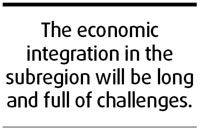Endowments of the river
(China Daily)
Updated: 2008-03-31 07:13
Updated: 2008-03-31 07:13
China guarantees countries situated in the lower reaches of the Mekong River it will not harm them.
When launching developments along the river, China has always taken the interests and concerns of these countries into consideration. The communication has been open and timely.
China upholds the principle of consultation and mutual benefit when working to solve the issues of development along the Mekong River.

Premier Wen Jiabao, who is visiting Laos, will attend the third meeting of leaders of the Greater Mekong Subregion (GMS) nations - namely Cambodia, China, Laos, Myanmar, Thailand and Vietnam. Today the leaders will sign several documents on new projects they will work on, and release a declaration on what they should strive for in the future.
The evolvement of the theme of the conference from "A Stronger Partnership for Common Prosperity" last year to "Enhancing Competitiveness Through Greater Connectivity" this year shows the subregion's commitment to cooperation.
The GMS economies, predominantly based on subsistence agriculture, are gradually diversifying into several modern economic sectors, rooted in a more transparent, market-based system. The human and natural resources of the Mekong region has made it a new frontier for Asian economic growth.
The GMS program first focused on basic infrastructure that would help link the subregion and enable development. Transportation and energy were the main targets. It contributed to the freer flow of people and goods and to sharing of resources key to industrial development and modernization. It also led to international recognition of the subregion as a growth area.
Its dimension has been increasingly expanded to other sectors such as human resource development, environment, tourism, investment and trade, transportation and energy projects.
The program includes initiatives to resolving policy, regulatory and other non-physical barriers to the cross-border traffic.
Regional economic co-operation is an important element in the development strategy of the countries. To be competitive, the six Mekong countries must utilize their natural resources wisely and employ their human resources efficiently.
A more integrated, focused and policy-oriented co-operation process is under way. The road to economic integration in the Mekong subregion will be long and full of challenges. But with strong commitment from all parties, more success will be achieved.
(China Daily 03/31/2008 page4)
|
|
|
|